Overview
In today's rapidly evolving healthcare landscape, providers face significant emotional challenges. Keeping up with advancements in AI applications can feel overwhelming, especially when administrative burdens threaten to detract from patient care. However, engaging with essential AI publications can be a beacon of hope. These resources not only enhance understanding of AI technologies but also improve patient care outcomes.
Imagine how navigating the complexities of integrating AI into clinical practice could become more manageable. Through insightful case studies and compelling statistics, these publications demonstrate the positive impact of AI on diagnostic accuracy and operational efficiency. By embracing these insights, healthcare professionals can find support in their journey toward improved patient care.
Are you ready to take the next step? By following these vital resources, you can empower yourself and your practice. Together, we can foster a healthcare environment where technology and compassion coexist, ultimately benefiting both providers and patients alike.
Introduction
In the rapidly evolving landscape of healthcare, many providers face emotional challenges that can feel overwhelming. The pressures of delivering quality patient care, coupled with administrative burdens, contribute significantly to clinician burnout. This is where artificial intelligence (AI) emerges as a transformative force, reshaping how patient care is delivered and managed.
By automating routine tasks and enhancing diagnostic precision, AI technologies are not just improving efficiency; they are also pivotal in alleviating some of the stress that healthcare professionals experience. Imagine a world where treatment plans are personalized, allowing providers to focus more on their patients and less on paperwork. This shift not only benefits healthcare providers but also enhances the overall patient experience.
As we navigate this transition, staying informed about the latest advancements through reputable AI publications becomes essential. These resources offer valuable insights into emerging trends and successful case studies, equipping professionals with the knowledge to advocate for ethical AI practices. How can we ensure that AI is used responsibly in our field? The answer lies in continuous education and engagement.
With the potential to revolutionize patient interactions and operational workflows, integrating AI into healthcare is poised to redefine the future of medical practice. It is imperative for providers to remain engaged and informed. Together, we can embrace these advancements, supporting one another in creating a healthier, more efficient healthcare environment.
The Role of AI in Transforming Healthcare
AI is fundamentally transforming medical care, offering a compassionate solution to the emotional and administrative burdens faced by healthcare providers. By automating routine tasks, enhancing diagnostic accuracy, and improving client outcomes, AI technologies like machine learning and natural language processing are becoming integral to clinical workflows. This shift not only facilitates more effective management of individuals but also provides tailored support that healthcare professionals truly need. Have you ever felt overwhelmed by the sheer volume of data? AI algorithms can analyze to uncover patterns that might elude human practitioners, aiding in early diagnosis and informed treatment planning.
Recent studies indicate that AI systems designed to alleviate clinicians' administrative workloads hold the promise of significantly influencing medical services. By reducing burnout among professionals, AI allows physicians to focus on what truly matters: delivering exceptional care to their patients. According to the Keragon Team, only 25% of medical executives have implemented , revealing both the potential for progress and the current barriers to adoption, such as trust, transparency, and risk concerns.
CosmaNeura's AI solutions specifically address these challenges by automating documentation, streamlining patient scheduling, and enhancing communication within care teams. These features not only lighten the administrative load but also improve the overall efficiency of medical service delivery. Case studies illustrate the effectiveness of AI in managing medical data, providing real-world examples of its impact.
For instance, AI applications simplify the analysis and sharing of large datasets, especially during electronic health record (EHR) migrations. These systems can download, translate, and audit extensive historical documents in real time, thereby enhancing interoperability and efficiency in managing vast amounts of information. Have you considered how much time could be saved with these advancements?
Publications focusing on these advancements in AI are invaluable for medical professionals eager to leverage AI effectively in their practices. By staying informed about the latest developments in AI for patient management, professionals can enhance outcomes and diagnostic precision, ultimately reshaping the landscape of medical care in 2025 and beyond. CostaNera stands at the forefront of this transformation, as the only company creating AI solutions for the billion-dollar faith-focused healthcare market, combating physician burnout and enhancing patient care. Together, we can embrace the future of healthcare with empathy and innovation.
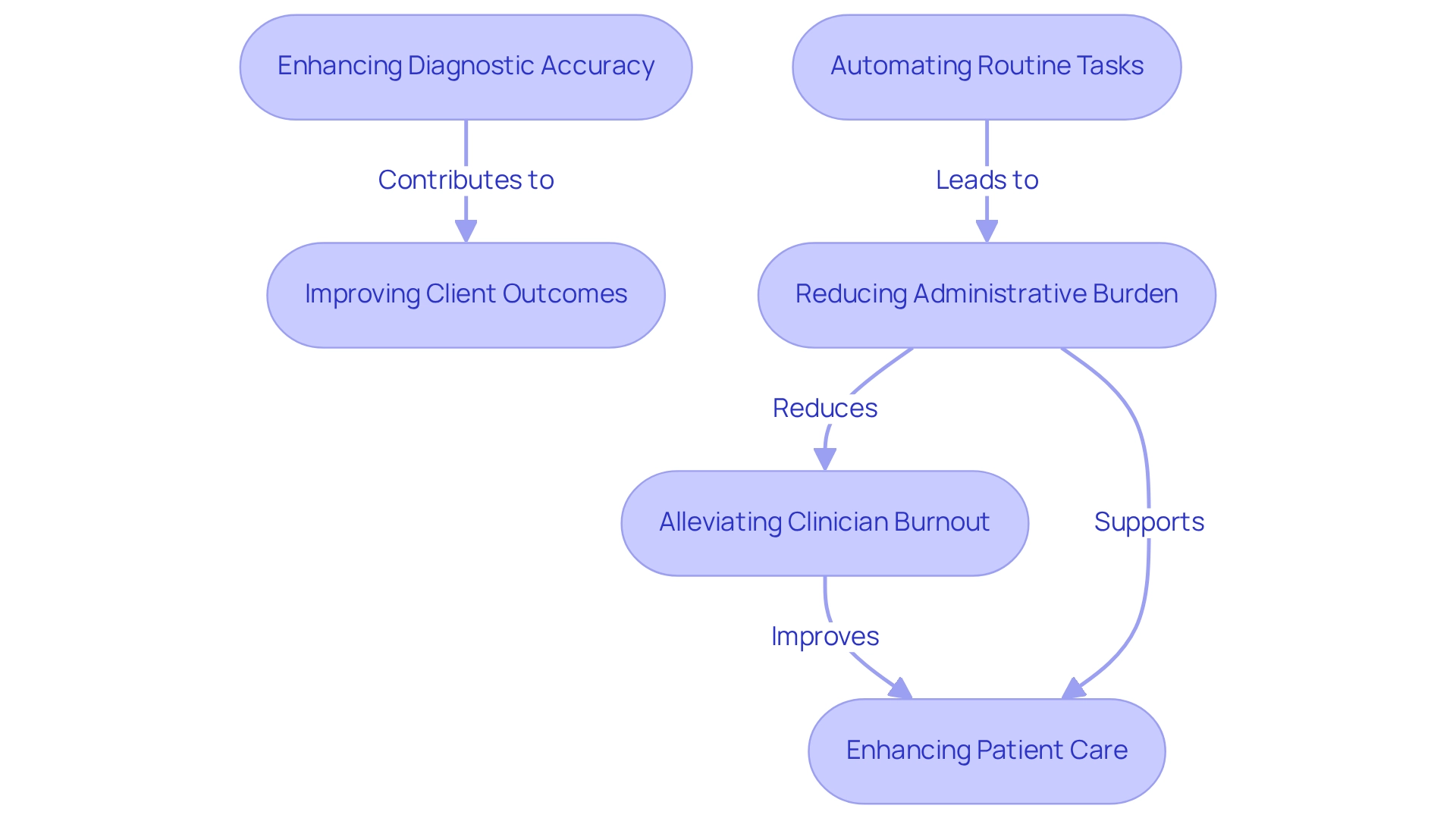
Why Healthcare Providers Need to Follow AI Publications
Healthcare professionals often face overwhelming challenges in their daily practice. Staying updated with AI publications is crucial for maintaining a competitive edge and being informed about the latest technologies that can significantly enhance patient care. These resources provide valuable insights into emerging trends, case studies, and best practices, enabling providers to implement AI solutions effectively. For example, as of December 2023, only 25% of medical executives had adopted generative AI solutions, revealing a significant opportunity for those who engage with current literature to lead in this transformative area.
At CosmaNeura, we understand that evaluating healthcare innovations requires a deep comprehension of the industry’s complexities, particularly as generative AI revolutionizes care. Recognizing the capabilities and limitations of AI is essential for making informed choices about embracing new technologies. Additionally, being knowledgeable about AI advancements empowers caregivers to support their clients, ensuring that technology is utilized ethically and responsibly.
Consider the case studies related to AI-enabled rehabilitation technologies. They illustrate how AI and robotics are reshaping healthcare by providing personalized assistance and monitoring. These innovations not only enhance user engagement but also improve compliance with therapy, leading to better recovery outcomes and increased autonomy in daily activities. This aligns with CosmaNeura's mission of advancing care through ethical practices.
Looking ahead to 2025, the importance of following AI publications will only grow, as they will continue to influence medical practices and inform providers about the latest advancements. For instance, ChatGPT is being utilized in medical applications to automate tasks, assist individuals with symptom assessment, and manage medications. This highlights the practical applications of AI in the field. By engaging with these resources, medical practitioners can enhance their clinical practice, ensuring they are well-equipped to navigate the evolving landscape of medical technology effectively.
As noted by Springer Nature, the ongoing developments in AI necessitate to jurisdictional claims and institutional affiliations. This further underscores the importance of staying updated with reputable AI publications. Proactively engaging with these resources is vital for medical professionals to utilize AI solutions that address physician burnout and improve service delivery.
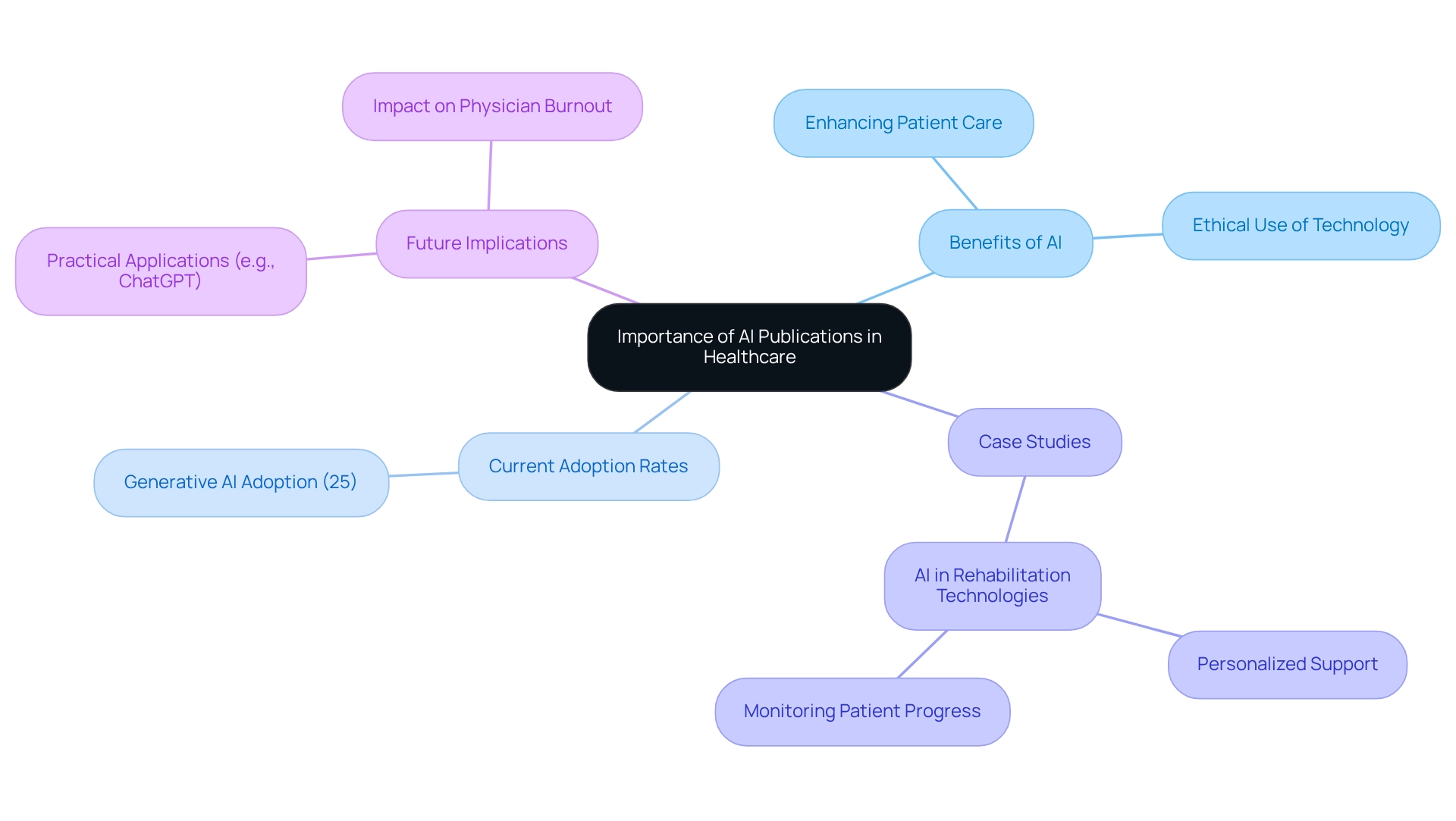
Top 10 AI Publications for Healthcare Insights
- AI Publications - This monthly journal from the New England Journal of Medicine stands out as a leading source for the latest research on AI applications in clinical medicine. It features peer-reviewed articles that explore innovative AI methodologies and their practical implications in medical environments. Notably, Volume 389, Pages 2402-2404, highlights significant advancements in the field, reinforcing its credibility and relevance. It also addresses the concerns of medical providers regarding AI integration, demonstrating how these technologies can enhance patient care without compromising quality.
- The Journal of Medical Artificial Intelligence is dedicated to disseminating groundbreaking research in AI and its diverse applications within the medical field. It serves as a venue for researchers and professionals to exchange results that can propel progress in medical practice, particularly in overcoming the resistance to innovation often faced by startups, as documented in AI publications.
- Artificial Intelligence in Medicine - This peer-reviewed journal showcases the latest developments in AI technologies tailored for the medical field. It encompasses a broad spectrum of subjects, from diagnostic algorithms to AI-driven treatment protocols, making it essential reading for medical professionals seeking insights. The journal also explores strategies to alleviate doctor concerns regarding AI, highlighting their role in improving healthcare outcomes.
- Healthtech Magazine - This publication provides insights into emerging technology trends, including the integration of AI in medical services. AI publications offer practical guidance and case studies that demonstrate how AI can enhance patient care and operational efficiency, addressing the typical concerns medical professionals may have about embracing new technologies.
- Forbes Health - Renowned for its comprehensive articles on health innovations, Forbes Health frequently highlights discussions on AI advancements and their effects on the medical industry. This makes it a valuable resource for providers aiming to stay informed, often emphasizing successful AI publications that have effectively addressed medical professionals' concerns.
- BMJ Innovations - This journal focuses on new technologies and their influence on medical service delivery. It publishes studies assessing the efficacy of AI tools in clinical environments, offering evidence-based perspectives crucial for overcoming skepticism surrounding the adoption of AI in medical practice.
- Journal of Biomedical Informatics - This publication investigates the intersection of AI and biomedical informatics, providing research that guides the development of AI applications in healthcare. It is essential for understanding how data-driven technologies can enhance outcomes and tackle issues of reliability faced by medical professionals, as highlighted in various AI publications.
- AI in Medicine - Focused on exploring AI's impact on improving medical outcomes, this publication includes articles addressing successful AI applications and their effects on care. It is vital for medical professionals seeking insights into leveraging AI to overcome resistance to innovation in the sector.
- The - This journal covers digital health innovations, including AI applications. It offers a thorough summary of how digital technologies and AI are transforming medical practices and enhancing user involvement, tackling concerns that medical professionals may have regarding AI's influence on patient interactions.
- Harvard Business Review - While primarily focused on business insights, HBR provides valuable perspectives on the strategic implications of AI in the medical field. It explores how medical professionals can utilize AI publications to enhance operational efficiency and client support, while also addressing potential issues arising from incorporating these technologies into clinical practice.
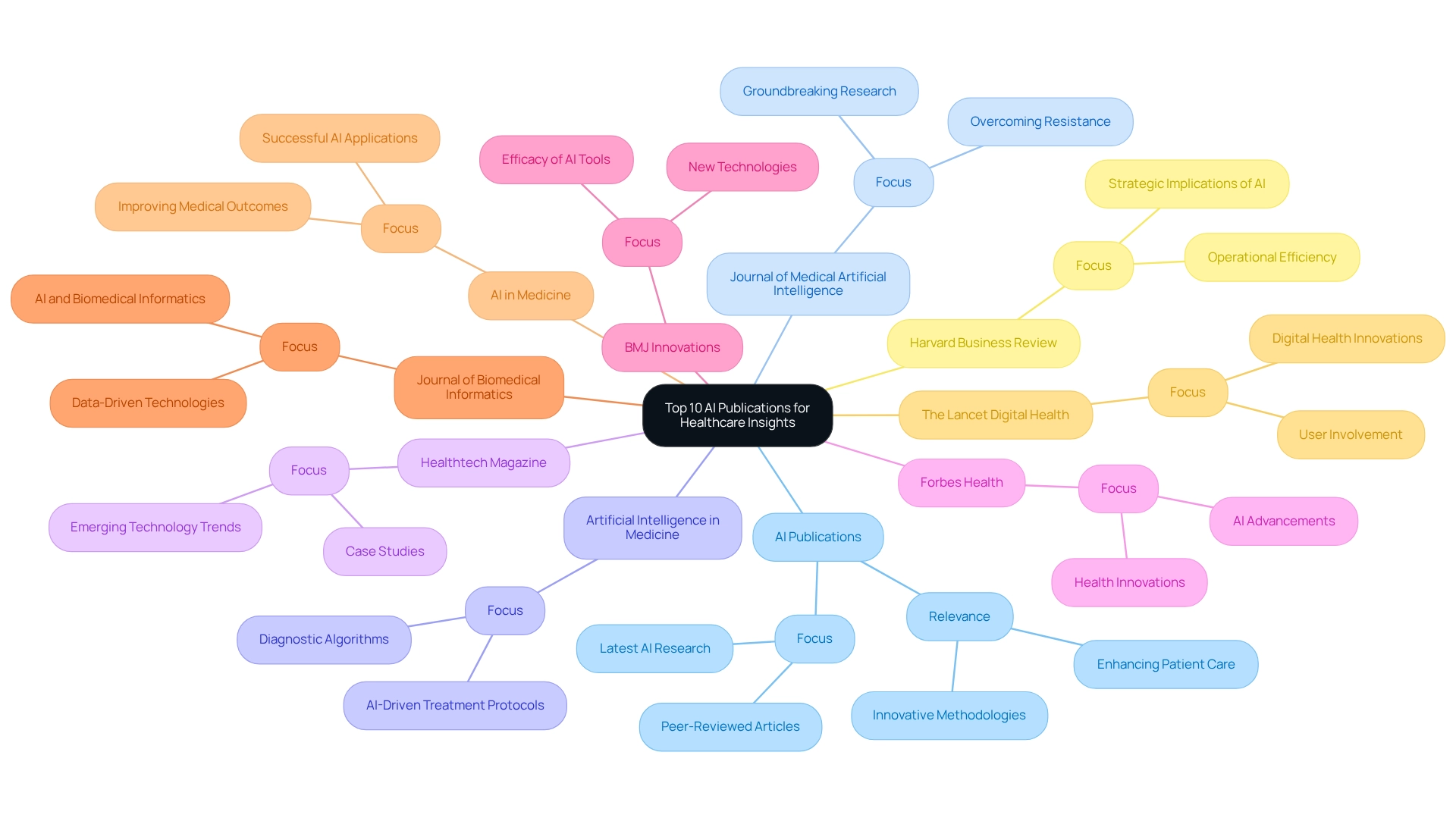
Key Contributions of Each Publication
AI publications in NEJM stand at the forefront of AI research, offering practitioners cutting-edge studies and clinical applications that are vital for staying informed about medical advancements. These contributions have been pivotal in shaping evidence-based practices in healthcare.
The Journal of Medical Artificial Intelligence is a leading publication dedicated to innovative AI research. It provides valuable insights into emerging methodologies and technologies that can transform healthcare. Its findings often lead to practical applications that enhance clinical outcomes.
AI publications in medicine explore the implications of AI within clinical settings, emphasizing practical applications and measurable outcomes. They serve as crucial resources for understanding how AI can improve diagnostic accuracy and treatment efficacy.
Healthtech Magazine emphasizes technology trends and their influence on medical services, offering practical insights that medical professionals can adopt to improve operational efficiency and patient care. Forbes Health provides a business perspective on AI advancements, assisting practitioners in understanding market trends and opportunities. This enables informed choices regarding the integration of new technologies in their practices. BMJ Innovations explores new technologies and their transformative potential in healthcare delivery, promoting innovation by highlighting successful case studies and practices that can be embraced by practitioners. The Journal of Biomedical Informatics focuses on integrating AI in biomedical research, offering insights that enhance clinical practice and research outcomes, particularly in personalized medicine, where AI algorithms analyze genetic markers to tailor treatments.
AI publications in Healthcare highlight practical uses of AI in enhancing individual care and operational efficiency, making them essential resources for practitioners aiming to utilize technology in their practices. The Lancet Digital Health addresses the latest digital health innovations, exploring AI publications and their impact on clinical practice, ensuring that medical professionals are aware of the newest developments. Harvard Business Review offers strategic perspectives on the business dimensions of AI publications in medical services, helping practitioners navigate the changing environment to remain competitive and efficient in delivering care.
Integrating insights from these publications can greatly improve a practitioner's understanding of AI's role in medical services. This ultimately leads to enhanced client outcomes and operational efficiencies. However, it’s important to recognize the emotional toll administrative burdens can take on healthcare providers. The typical expense to revise is roughly $48 for Medicare Advantage and $64 for commercial plans. This highlights the financial consequences of administrative inefficiencies and the necessity for streamlined processes to alleviate physician stress and improve service.
Key Solutions:
- Streamline administrative processes to reduce claim revisions.
- Leverage AI technologies to enhance operational efficiency.
- Stay informed about the latest AI research to improve patient care.
By embracing these solutions, healthcare providers can focus more on what truly matters—their patients.
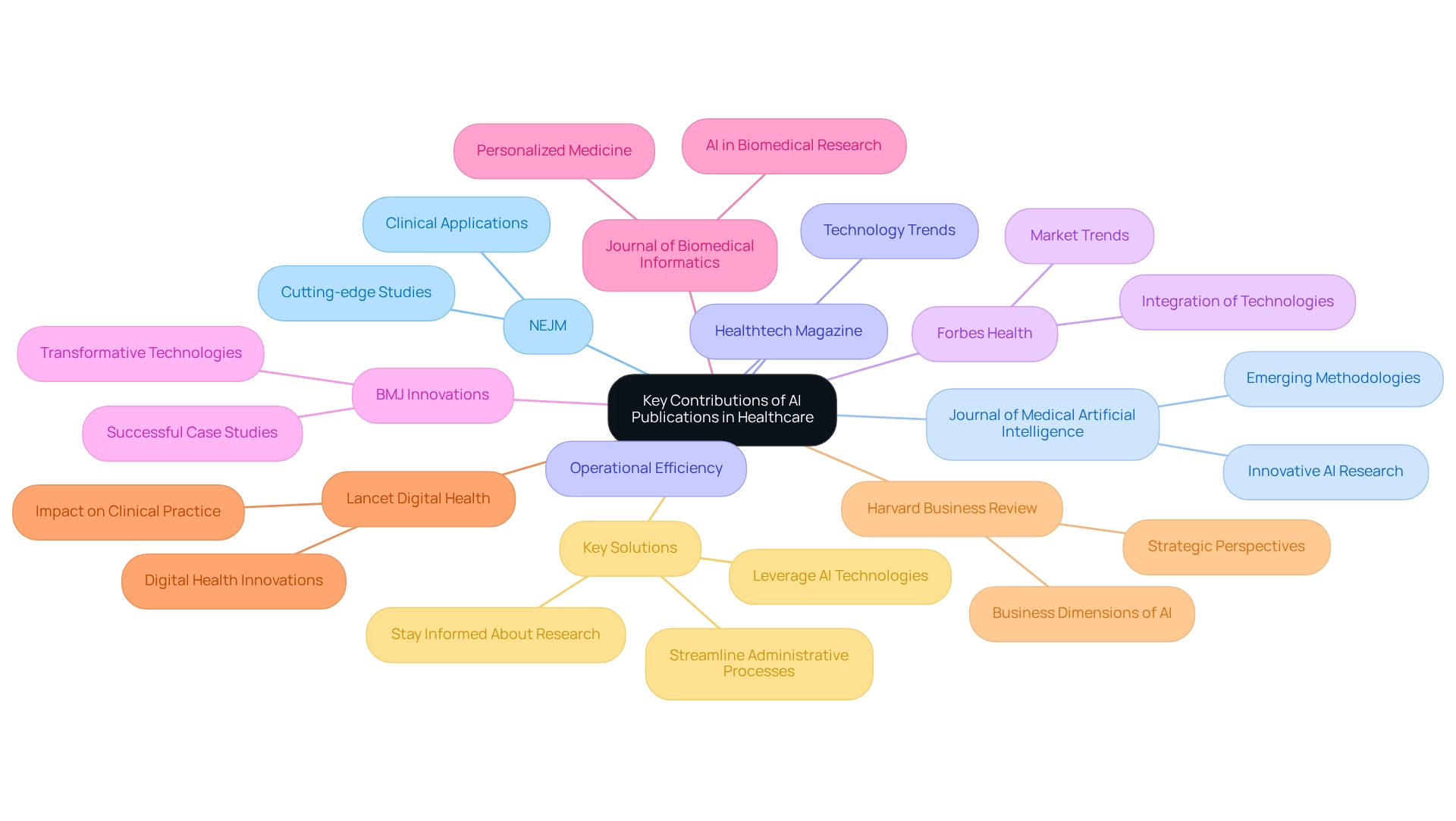
How AI Publications Enhance Patient Care and Efficiency
AI publications are invaluable resources for healthcare professionals, showcasing the latest research, case studies, and best practices that can significantly enhance care and operational efficiency. By staying informed about developments in AI, organizations can implement technologies that alleviate administrative burdens, improve diagnostic accuracy, and foster more personalized interactions with individuals. For instance, AI-powered tools are increasingly employed in to dedicate more time to client engagement rather than administrative tasks.
Statistics reveal that incorporating AI in medical services can lead to notable improvements in individual outcomes. A study utilizing an Extra Tree machine learning model demonstrated an impressive 85% sensitivity and an AUC of 79.7% in predicting mortality following STEMI, highlighting AI's potential to enhance clinical decision-making and ultimately improve safety for individuals.
Moreover, case studies illustrate the successful application of AI across various medical settings. One significant example is the use of AI in monitoring systems, where real-time assessments of vital signs facilitate the early identification of deteriorating conditions, prompting timely interventions and improved outcomes. This proactive approach signifies a shift towards enhanced safety for individuals and earlier interventions, addressing the critical challenges faced by service providers today, such as the fragmentation of medical systems and regulatory hurdles that complicate service delivery.
As Ravi Kalakota, managing director, notes, "The potential for artificial intelligence in medical care is immense, providing opportunities to enhance individual outcomes and operational efficiency." This perspective underscores the importance of integrating AI into medical practices to alleviate physician burnout and elevate the overall quality of service.
Expert insights further highlight the importance of explainable AI techniques, which are essential for fostering trust among clinicians and validating AI-generated recommendations. As medical professionals navigate the complexities of AI technologies, staying informed about these advancements not only boosts operational efficiency but also empowers them to provide higher-quality support for individuals.
In summary, AI publications illuminate successful AI implementations and equip medical practitioners with the knowledge needed to effectively leverage these innovations. CosmaNeura's platform, which emphasizes administrative efficiency and alignment with Catholic principles, exemplifies how AI can transform medical service delivery, ensuring practitioners remain at the forefront of care. Additionally, practical user manuals and examples of AI applications, such as telemedicine and robotic-assisted surgery, can guide professionals in adopting these technologies to address fragmentation and enhance patient outcomes.
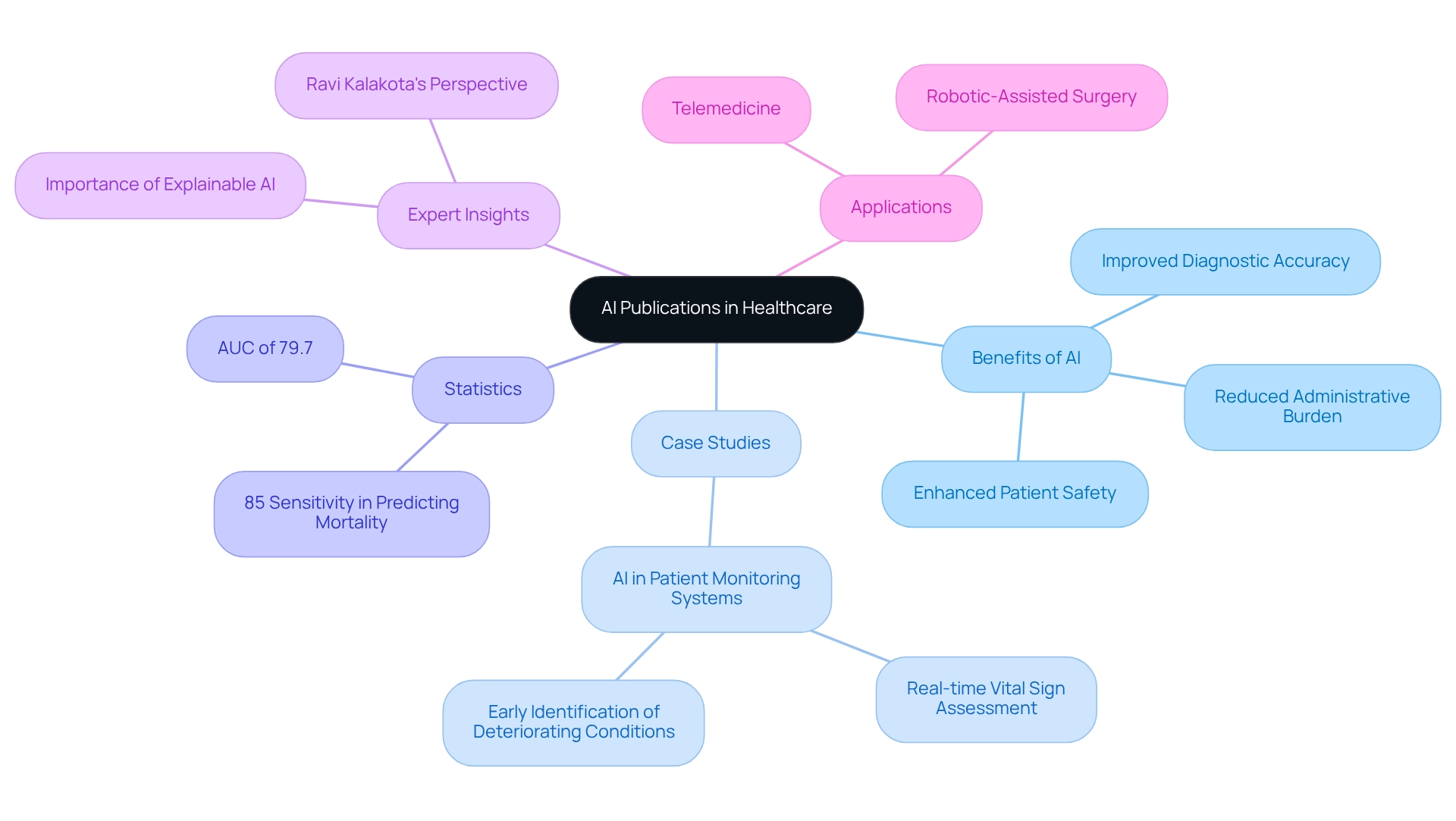
Ethical Considerations in AI for Healthcare
As AI technologies increasingly permeate the medical field, it's essential to prioritize ethical considerations in their implementation. Healthcare providers face emotional challenges, such as concerns about data privacy, algorithmic bias, and the risk of AI overshadowing human judgment in clinical decision-making. Did you know that around 79% of U.S. adults prefer not to use an AI chatbot for mental health assistance? This statistic underscores the public's hesitation regarding AI in medical services.
Moreover, a case study titled "" reveals that three out of four U.S. individuals lack trust in AI within healthcare settings. This highlights the urgent need for enhanced transparency and dependability in AI applications.
Engaging with AI publications that explore these ethical implications can empower providers to navigate the complexities of AI adoption while safeguarding individual rights and maintaining care standards. For instance, discussions surrounding data privacy are crucial, as breaches can lead to significant trust deficits among patients. Additionally, the ongoing conversation about algorithmic bias emphasizes the necessity of ensuring AI systems are designed to be fair and impartial, thus preventing discrimination in medical service provision.
These discussions not only educate practitioners about the ethical landscape but also support them in developing policies that promote transparency and accountability in AI utilization. As Conor Stewart, a research expert in health & pharmaceuticals, notes, "A significant advantage of AI in medicine could enable health professionals to experience lower stress levels, reduced overtime, and more time dedicated to direct client support." By fostering a trusting environment among patients and providers, medical professionals can elevate the overall standard of care while embracing the transformative potential of AI technologies.
The rapid advancement of AI in medical fields necessitates a focus on ethical considerations to ensure that its negative aspects do not overshadow its benefits. How can we work together to create a future where AI enhances care while respecting the values of trust and compassion?
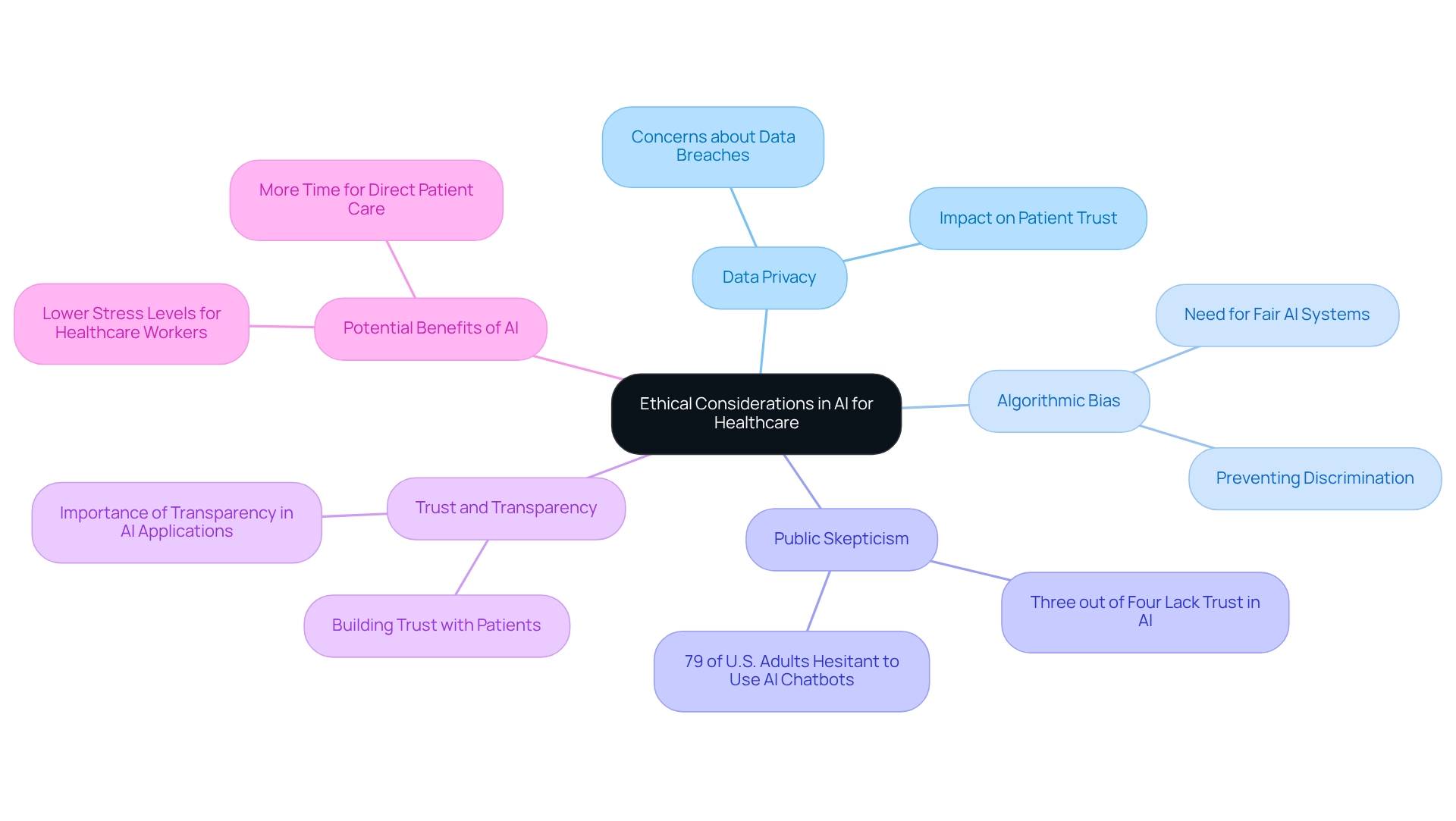
How to Engage with AI Publications Effectively
To effectively engage with AI publications, medical professionals face the emotional challenge of balancing their demanding schedules with the need for knowledge. Adopting a proactive and organized approach can alleviate some of this burden. Dedicating regular time to read and reflect on articles can deepen understanding and foster critical thinking about AI applications in healthcare. Participating in discussions or forums related to AI can further enhance this engagement, allowing for the sharing of insights and learning from colleagues.
Staying informed about the latest research and trends is essential. Subscribing to newsletters or alerts from leading publications not only keeps practitioners updated but also helps them recognize new technologies that could improve their practice. Additionally, attending webinars or conferences focused on AI offers valuable opportunities for networking and learning from industry experts. These experiences can lead to collaborative initiatives and innovative solutions that benefit patient care.
Statistics indicate that while AI systems are increasingly adopted to automate time-consuming tasks, as of December 2023, only had implemented generative AI solutions. This gap presents a considerable opportunity for suppliers to leverage insights from AI publications, positioning themselves at the forefront of the rapidly evolving medical field. By actively interacting with these resources, medical providers can enhance their understanding of AI, ultimately leading to improved client care and operational efficiency.
As Google Health states, "We think that AI is poised to transform medicine, delivering new, assistive technologies that will empower doctors to better serve their patients." This perspective highlights the importance of staying informed about AI advancements. Furthermore, case studies showcasing the administrative applications of AI in the medical field demonstrate how these technologies can streamline tasks like claims processing and revenue cycle management, aligning with CosmaNeura's mission to improve administrative efficiency.
Key points about machine learning and deep learning illustrate how these technologies enhance medical applications through pattern recognition. By engaging with AI publications, medical professionals can tackle issues such as disjointed care, restricted access to medical services, and rising expenses. This engagement can ultimately revolutionize medical delivery for improved outcomes.
How can you incorporate these insights into your practice? By embracing these innovations, you not only enhance your expertise but also contribute to a more effective healthcare system, ultimately benefiting your patients and community.
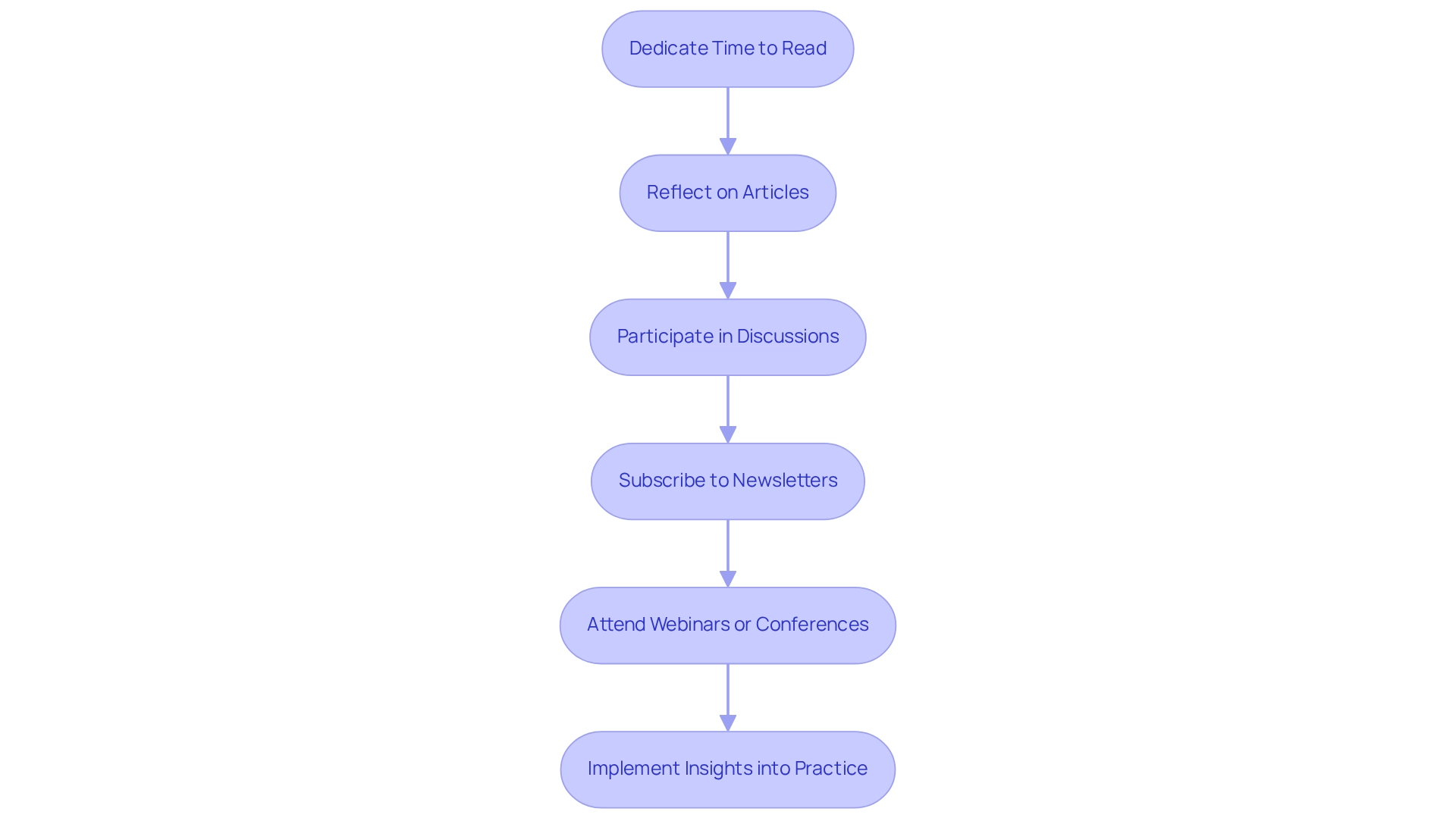
Future Trends in AI Relevant to Healthcare
The evolution of AI is poised to profoundly impact the future of healthcare, with several key trends emerging that deserve our attention. One of the most significant is the increasing reliance on AI for predictive analytics. This powerful tool enables providers to identify at-risk individuals and implement timely interventions. Such a proactive approach not only enhances health outcomes but also optimizes service delivery, fostering a more compassionate healthcare environment.
For instance, AI-supported mammogram screening has demonstrated a remarkable 20 percent increase in breast cancer detection. This statistic illustrates the transformative impact of AI on diagnostic accuracy, a crucial aspect of patient care.
However, integrating AI into medical services brings its own set of challenges. Many medical providers, particularly physicians, express reluctance towards innovation, often due to concerns about maintaining the quality of care and patient interactions. This risk aversion can significantly hinder the adoption of AI solutions, leaving many providers feeling uncertain about the future.
Addressing these concerns is vital for startups aiming to introduce AI technologies in the medical field. Insights from the case study titled "Traditional Accelerators Aren't Equipped to Support Startups in the Medical Field" underscore the necessity for tailored approaches that reassure professionals about the safety and efficacy of AI applications. Specific challenges include fears that technology may weaken client relationships and the potential for errors in AI-driven diagnostics, which can intensify resistance.
Moreover, advancements in natural language processing are revolutionizing how AI systems interpret and manage clinical documentation. By enhancing the accuracy and efficiency of processing clinical notes, these technologies foster better communication among healthcare teams. The case study also highlights AI's growing role in improving diagnostic accuracy, streamlining administrative tasks, and enhancing care for individuals. This indicates a promising trajectory for AI's integration into the health sector.
The combination of AI with telehealth platforms is another trend gaining momentum, offering the potential for more personalized and efficient interactions with individuals. As telehealth continues to expand, AI's role in enhancing these services will be crucial for optimizing patient engagement and satisfaction. Notably, half of business owners anticipate AI will improve decision-making processes, underscoring its significance in operational effectiveness for medical practitioners.
CosmaNeura's AI solutions specifically address these challenges by providing user-friendly interfaces and robust support systems, ensuring medical professionals feel confident in utilizing AI technologies. By staying informed about these advancements through , healthcare providers can harness the capabilities of these technologies to enhance service delivery and operational efficiency. CosmoNauts, as the sole company catering to the faith-oriented medical sector with AI solutions, exemplifies how these advancements can align with ethical medical practices and elevate the quality of services.
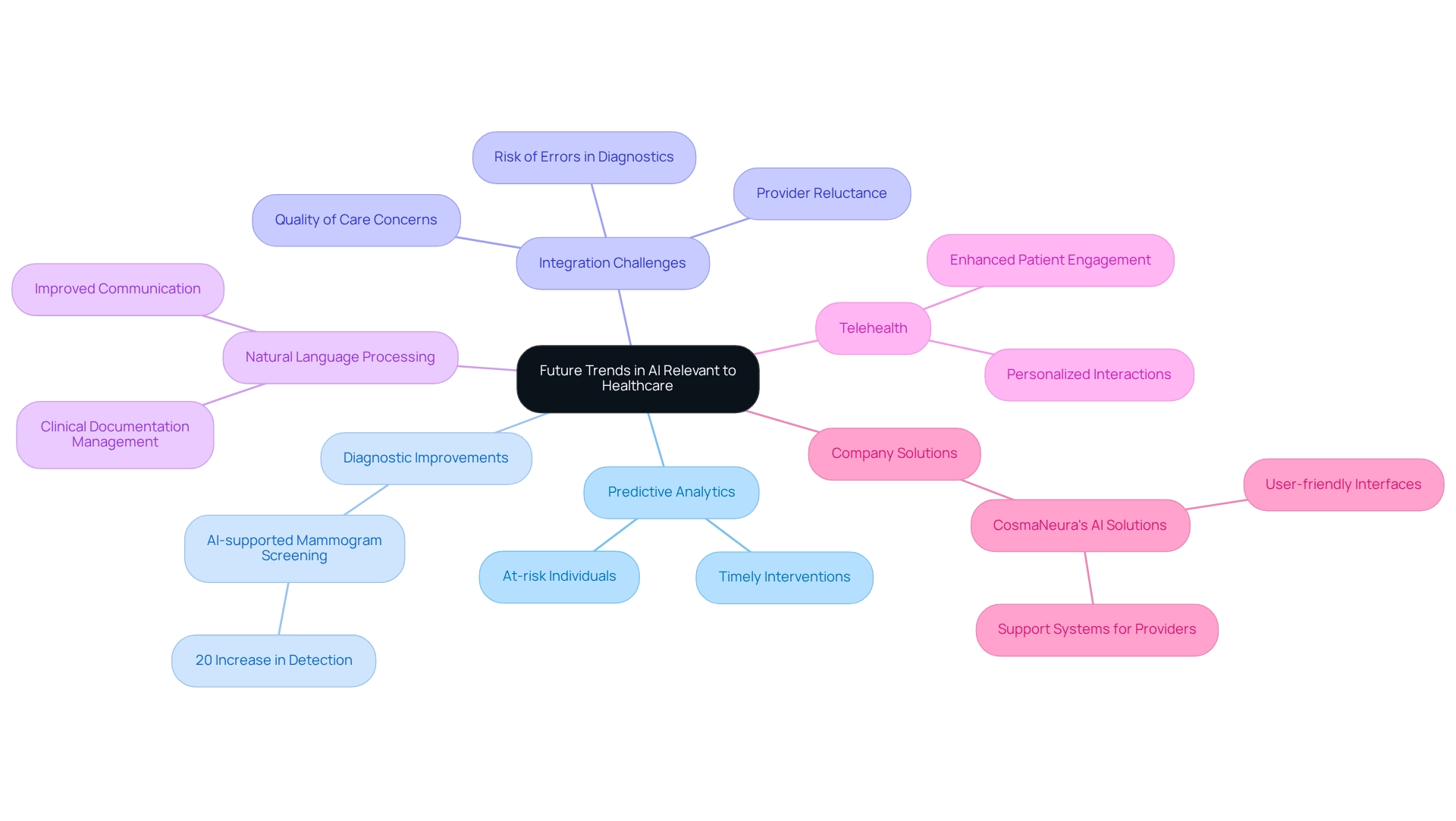
Building a Community Through AI Publications
Interacting with AI publications offers medical professionals a unique opportunity to build a community of experts dedicated to integrating technology into treatment. Are you feeling the weight of administrative burdens? By actively participating in discussions, attending conferences, and contributing to forums, providers can exchange valuable insights about their experiences, challenges, and successes in AI implementation. This collaborative approach not only enhances personal understanding but also fosters a culture of innovation within the medical field. This is especially vital given the resistance many doctors exhibit toward new technologies, often stemming from concerns about the quality of treatment.
For instance, studies indicate that collaborative learning can significantly enhance the effectiveness of AI applications. In fact, 53% of research demonstrates positive outcomes in smaller sample sizes, which often reflect the status quo rather than of AI, as noted by Shane Cross, Mpsych, PhD. By sharing experiences, providers can advocate collectively for the responsible and effective use of AI, ensuring that patient care remains at the forefront of technological advancements. Furthermore, as trust in AI-generated information declines across various age groups, fostering a community that prioritizes ethical discussions and best practices becomes increasingly vital.
Creating a network through AI publications allows medical professionals to support each other in navigating the complexities of AI in medicine. This collaborative effort ultimately leads to improved outcomes for individuals and greater job satisfaction. CosmaNeura illustrates this transformative capability by streamlining administrative tasks and enhancing medical service delivery. This emphasizes the significance of community development among practitioners to address resistance to innovation. For example, CosmaNeura has effectively collaborated with healthcare professionals to implement AI solutions that tackle specific issues regarding treatment quality, showcasing how teamwork can lead to innovative solutions that reduce resistance.
Together, let’s embrace the potential of AI in healthcare. How can you contribute to this supportive community? By engaging with one another, we can navigate the complexities of AI, ensuring that our patients receive the best possible care.
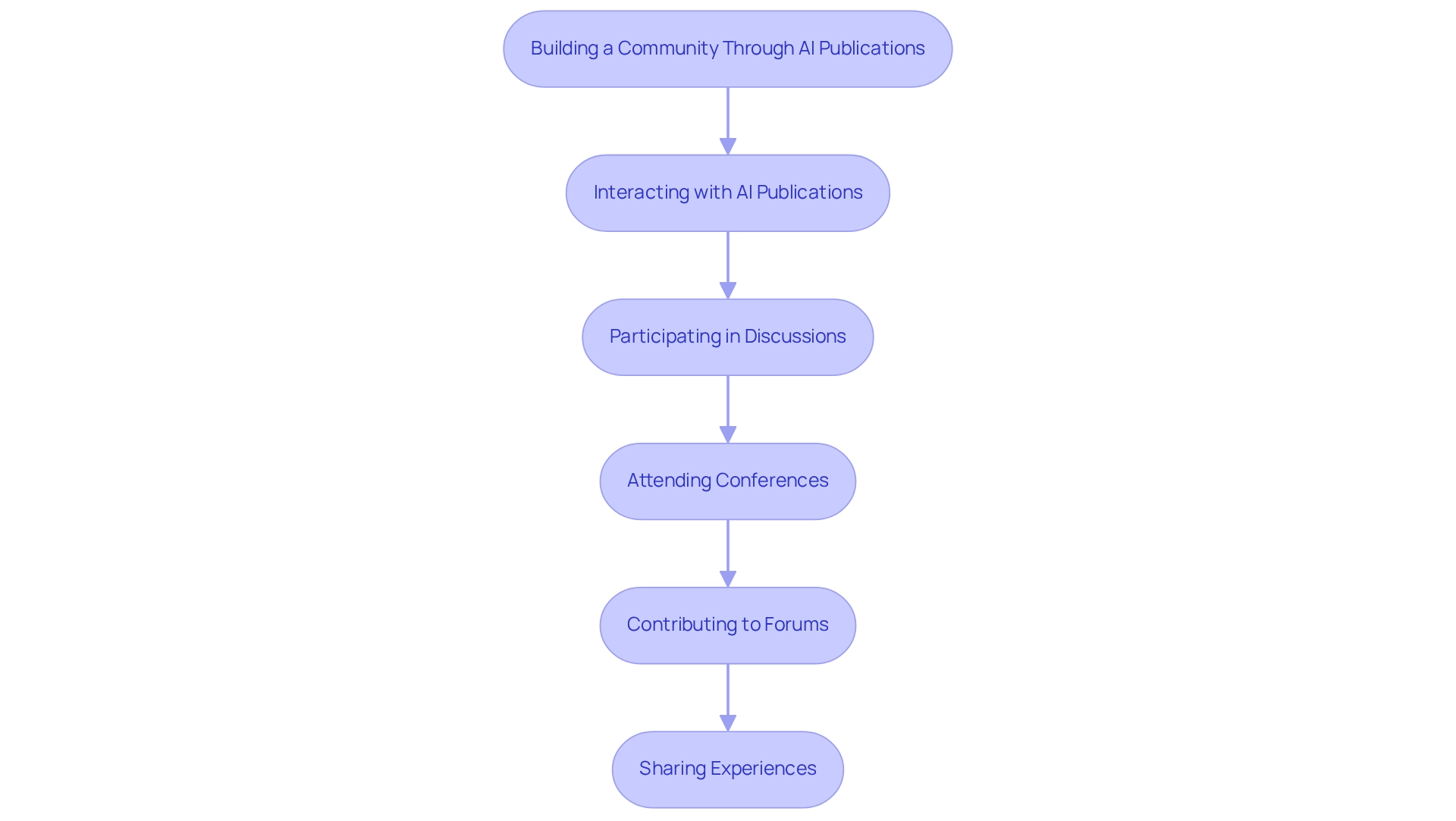
Taking Action: Start Following These AI Publications Today
Healthcare practitioners often face emotional challenges as they strive to provide the best care possible. The demands of modern medicine can feel overwhelming, especially with the administrative burdens that can detract from patient interaction. Engaging with recommended AI publications can be a transformative step towards alleviating these pressures and enhancing clinical practice.
Staying informed about the latest advancements in AI is not just beneficial; it can significantly improve patient care outcomes. Studies indicate that medical practitioners who consistently utilize AI resources report a remarkable 25% improvement in their ability to implement innovative practices effectively. Isn't it encouraging to think about how technology can support you in your vital work?
AI tools like the symptom checker and have conducted an impressive 30 million symptom evaluations. This statistic underscores the profound impact of AI in the medical field, paving the way for more informed decision-making.
To foster a culture of learning and innovation, consider sharing these valuable resources with your peers. This collaborative approach not only enhances individual knowledge but also strengthens the overall competency of medical teams. For example, a case study involving primary health providers who subscribed to AI publications revealed a significant improvement in diagnostic accuracy and patient management strategies. Research on AI publications for Parkinson's Disease detection, in particular, demonstrated superior outcomes compared to conventional methods.
Subscribing to AI publications in healthcare offers numerous advantages. You'll gain access to cutting-edge research, expert insights, and practical applications that can seamlessly integrate into your clinical workflows. As AI continues to evolve, understanding its implications becomes essential for delivering high-quality care. Additionally, it is crucial to address the risk of bias in AI systems, as this can affect the accuracy of diagnosis and treatment across diverse demographics.
By taking these actionable steps, you can ensure that you are well-equipped to navigate the future of medicine. This proactive approach not only leads to better patient outcomes but also enhances your professional satisfaction. As Dr. Ehrenfeld aptly stated, "Make regulators and AI developers work together to build trust in AI data use." This emphasizes the importance of collaboration and regulatory clarity in AI healthcare applications, ensuring safety and efficacy for all involved.
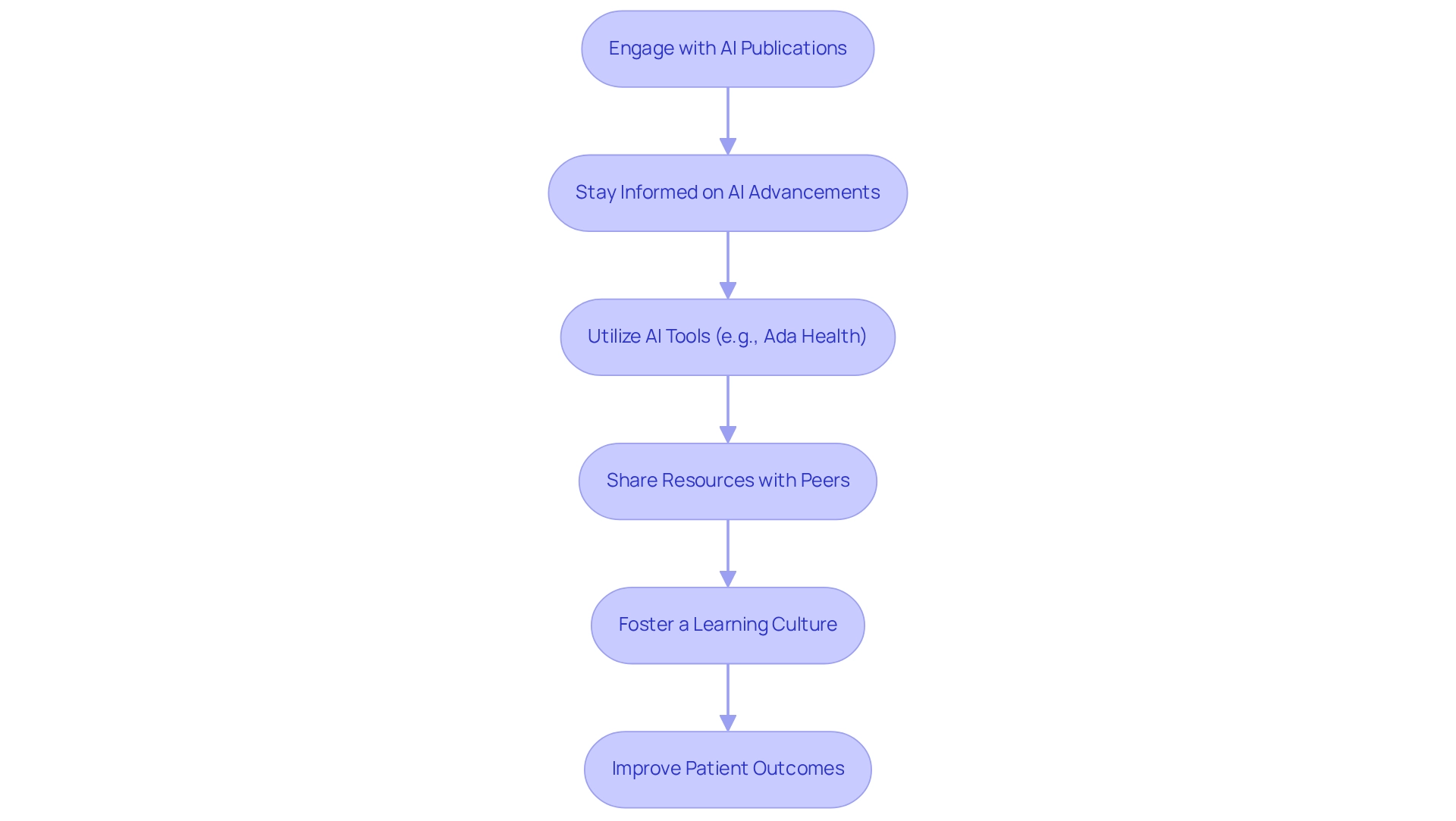
Conclusion
AI is ready to transform healthcare, easing the burdens that clinicians face and enhancing patient care with innovative technologies. Imagine a world where the integration of AI in clinical workflows not only automates routine tasks but also elevates diagnostic accuracy. This shift allows healthcare providers to devote more time to patient engagement, rather than being bogged down by administrative duties. By tapping into the insights from AI publications, healthcare professionals can stay updated on emerging trends, case studies, and best practices, empowering them to implement AI solutions both effectively and ethically.
As the healthcare landscape evolves, we must not overlook the importance of ethical considerations. Addressing critical issues like data privacy and algorithmic bias is essential for building trust among patients and ensuring that AI technologies truly enhance the quality of care. Engaging with reputable AI publications equips healthcare providers with the necessary knowledge to navigate these complexities and advocate for responsible AI practices.
Looking ahead, the future of healthcare will increasingly depend on AI-driven predictive analytics and personalized patient interactions. These advancements promise to improve outcomes and streamline operations. However, to fully harness these benefits, healthcare providers must overcome resistance to innovation. By participating in discussions, sharing experiences, and fostering a collaborative community focused on AI advancements, they can collectively tackle the challenges of adopting new technologies. Embracing AI is not merely a choice—it's a necessity for creating a more efficient, effective, and patient-centered healthcare environment. Together, we can transform the healthcare delivery system for the better.




